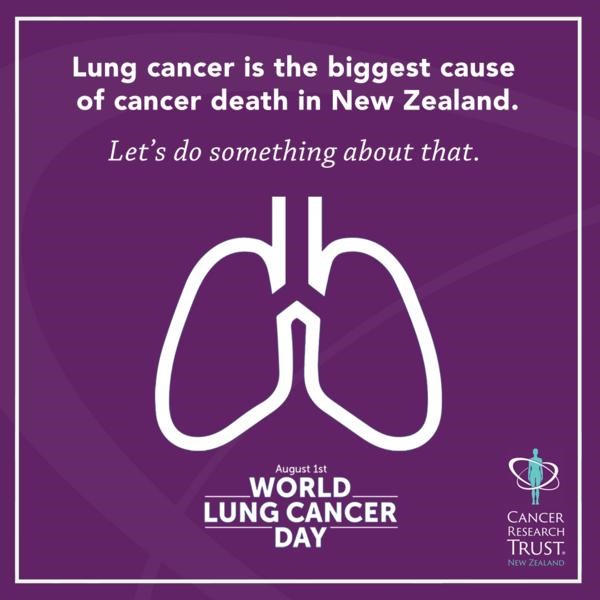 Every day we take over 20,000 life-giving breaths, but on World Lung Cancer Day – 1 August – we took a breather and united to raise awareness of one of the most common cancers worldwide.
Every day we take over 20,000 life-giving breaths, but on World Lung Cancer Day – 1 August – we took a breather and united to raise awareness of one of the most common cancers worldwide.
To put it another way, every year for the last fifty years, lung cancer has killed more New Zealanders than any other cancer — more than breast cancer, prostate cancer and melanoma combined. More than 1800 Kiwis die from lung cancer every year. That’s four times our national road toll.
These shocking statistics are exactly why days like World Lung Cancer Day are so important according to Cancer Research Trust NZ Executive Director, Professor Douglas Ormrod.
“While lung cancer has a tremendous impact on New Zealanders, the fact of the matter is, it is also largely preventable. Investing the resources necessary to prevent and cure these diseases is a cost-effective investment that benefits every Kiwi – not just those living with lung cancer. World Lung Cancer Day provides us with an opportunity to recognise the size of the problem and commit to taking concrete steps now to improve Kiwis lung health. Every breath is precious.”
WHAT CAUSES LUNG CANCER?
It’s been well established that the development of lung cancer is strongly associated with cigarette smoking — with approximately 90% of lung cancers attributable to tobacco use. This is because tobacco smoke contains more than 4,000 chemical compounds, many of which are cancer-causing (carcinogens). In addition, there is also a serious risk for those exposed to second hand cigarette smoke. Although the majority of lung cancers are linked to tobacco smoking, other causes of lung cancer include air pollution and inhalation of asbestos fibres.
WHAT ARE THE SYMPTOMS?
Many lung cancers are now treatable with targeted therapies and early intervention and people can survive if it is caught early.
Complicating this is the fact that the symptoms of lung cancer are varied and warning signs are not always obvious. In fact, some people who get lung cancer display no symptoms until the cancer is discovered during a routine chest x-ray or CT scan.
In people who do display symptoms, these may include the following:
- Persistent, worsening cough and hoarseness
- Shortness of breath, wheezing, and chest pain
- Coughing up excessive phlegm with blood
- Chest pain with coughing or breathing
- Recurring chest infections.
- Frequent episodes of bronchitis or pneumonia
- Weight loss, weakness, and fatigue.
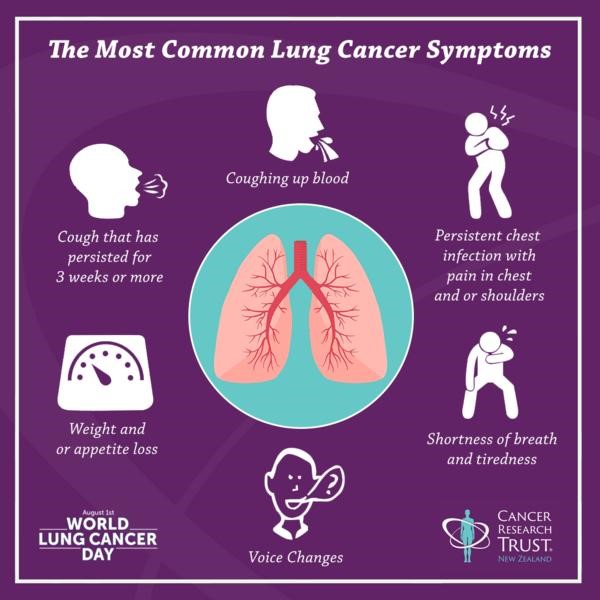
WHAT CAN BE DONE?
The most effective measure that can be taken to prevent the development of lung cancer is to simply stop smoking. Reducing exposure to passive smoking is also an effective method of prevention.
The main treatments for lung cancer are surgery, radiation treatment and chemotherapy.
The choice of treatment will depend on:
- the type of lung cancer
- whether the cancer has spread beyond the lung,
- how well your lungs are functioning
- your general health.
Many lung cancers are now treatable with targeted therapies and immunotherapy, such as pembrolizumab, which is a significant breakthrough compared to the current standards of care, however, unfortunately, New Zealand lags way behind the bulk of OECD countries with its funding of targeted therapies and immunotherapies in the public health system.
We know that research is our best hope against lung cancer and more needs to be invested in it in order to save lives — now and in the future.
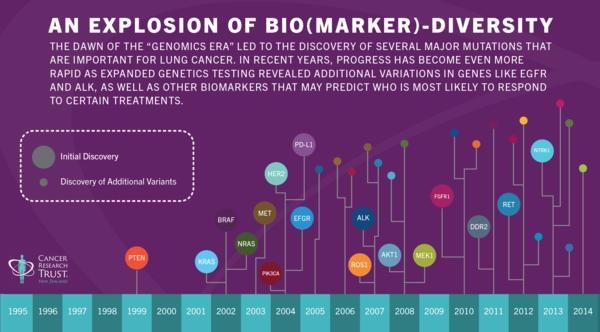
WHAT WE’RE DOING
Cancer Research Trust, one of the largest cancer research charitable trusts in New Zealand, has funded over $15 million in research and professional development projects since 2002 with every cent of every dollar donated applied to the work of the Trust.
We fund research and professional development across the cancer spectrum from prevention, through detection, diagnosis and treatment to end of life palliative or hospice care. No other New Zealand cancer charity can claim this.
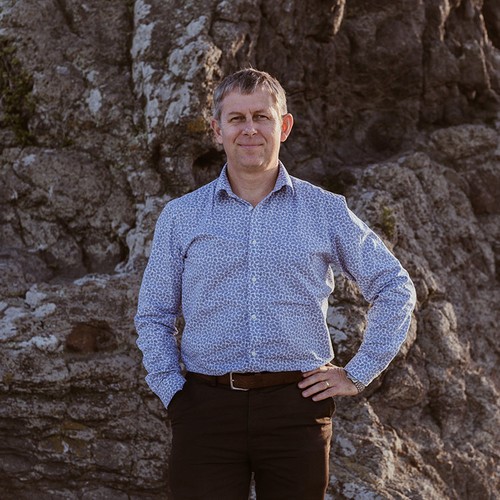 One such project is an innovative trial by Dr Scott Babington from the Canterbury DHB.
One such project is an innovative trial by Dr Scott Babington from the Canterbury DHB.
In 2012, we awarded Dr Babington a $120,908 grant to conduct a Randomised Phase III trial of Stereotactic Body Radiotherapy (SBRT) for early-stage inoperable non-small cell lung cancer (NSCLC)
This study tests a new method of treating early-stage lung cancer patients who decline or are not fit for surgery. This treatment uses very high precision radiotherapy called Stereotactic Body Radiotherapy (SBRT). The trial aims to determine if SBRT given in only three treatments over two weeks is better than current radiotherapy treatment given daily over six and a half weeks. New Zealand study patients will receive SBRT or standard radiotherapy treatment. This study will provide excellent evidence to guide New Zealand and international best practice and will enable us to gain valuable hands-on expertise in using SBRT.
The results of the trial which was presented, at World Conference on Lung Cancer, have so far been very encouraging. The trial showed a superior freedom from local failure for SABR, and more significantly a significant survival advantage for SABR. This is an amazing finding, very significant.
The trial is to be formally published in a significant peer-reviewed journal in the near future. In the meantime, the abstract is available to view here.
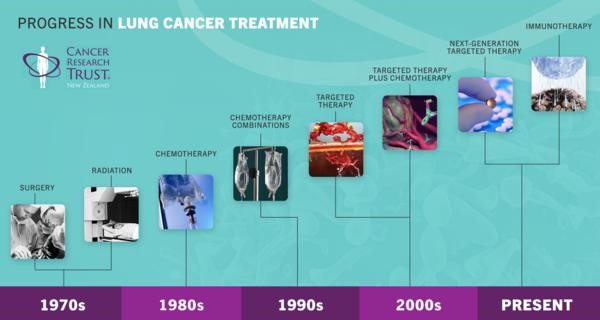
HOW YOU CAN HELP
We know that big things can happen from small beginnings and we give bold ideas about cancer a real chance to grow. Research is our best hope, and supporting innovative research projects like this one will help get cancer on the run.
We’re funding New Zealand’s best minds in cancer innovation. This includes funding research and professional development across the cancer spectrum, including lung cancer. From prevention, through detection, diagnosis and treatment to end of life palliative or hospice care- we’re working to give bold ideas about cancer a chance to grow, to help get cancer on the run. Find out how you can play you part.






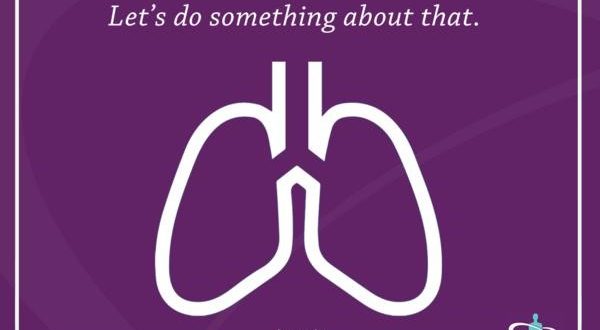

Join the Discussion
Type out your comment here:
You must be logged in to post a comment.